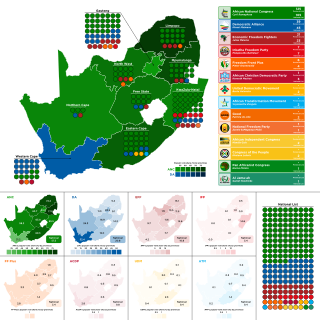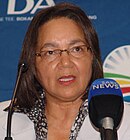
The City of Cape Town is the local government of Cape Town and surrounding areas. As of the 2011 census, it had a population of 3,740,026.

Municipal elections were held in South Africa on 18 May 2011, electing new councils for all municipalities in the country. Municipal elections are held every five years, and the previous municipal elections were held in 2006. The first municipal elections following the reorganisation of municipalities took place in December 2000.
Grant Haskin is currently serving as Member of the Cape Town City Council and Leader of the African Christian Democratic Party in the Cape Town City Council. He previously served as Executive Deputy Mayor of Cape Town, Acting Mayor of Cape Town, Mayoral Committee Member for Community Services and Sports and Amenities. He served in the Western Cape Provincial Parliament for two periods. While a Member of the Provincial Parliament, he served as Chairman of the Standing Committee on Public Accounts (SCOPA) and Special Delegate to the National Council of the Provinces.
A series of South African municipal by-elections was held in 2008 for ward seats on local municipal councils throughout the country. These by-elections were held to replace deceased, resigned or incapacitated councillors.

uMuziwabantu Municipality is a local municipality within the Ugu District Municipality, in the KwaZulu-Natal province of South Africa. uMuziwabantu is an isiZulu word meaning "the people's home", or "a home with wide open doors where everyone is welcome". The main source of income for the area is derived from the municipality's extensive wattle, gum, pine and poplar plantations, and associated industries, including saw mills and furniture-making factories.
The 2016 South African municipal elections were held on 3 August 2016, to elect councils for all district, metropolitan and local municipalities in each of the country's nine provinces. It was the fifth municipal election held in South Africa since the end of apartheid in 1994; municipal elections are held every five years.

General elections were held in South Africa on 8 May 2019 to elect a new President, National Assembly and provincial legislatures in each province. These were the sixth elections held since the end of apartheid in 1994 and determined who would become the next President of South Africa.
The council of the City of Cape Town in the Western Cape, South Africa is elected every five years by a system of mixed-member proportional representation. Half of the councillors are elected by first-past-the-post voting from individual wards, while the other half are appointed from party lists so that the total number of party representatives is proportional to the number of votes received. By-elections are held to replace the councillors elected by wards if a vacancy occurs.

The Drakenstein Municipal Council is the elected unicameral legislature of the Drakenstein Local Municipality in Paarl, Western Cape, South Africa.

The Electoral Commission of South Africa (IEC) announced on 20 March 2019 that a record number of 48 parties had registered candidates for the national parliamentary election. This is 19 more parties that contested the 2014 national elections. In the provincial legislature elections, the total number of parties registering candidates were:

The 2021 South African municipal elections were held on 1 November 2021, to elect councils for all district, metropolitan and local municipalities in each of the country's nine provinces. It is the sixth municipal election held in South Africa since the end of apartheid in 1994, held every five years. The previous municipal elections were held in 2016. On 21 April 2021, President Cyril Ramaphosa announced that the elections will be held on Wednesday, 27 October 2021. It had been recommend by Dikgang Moseneke to delay the municipal elections until 2022. The Electoral Commission of South Africa (IEC) requested the Constitutional Court to support the date postponement. The Economic Freedom Fighters (EFF) supported the date postponement while the Democratic Alliance (DA) was against the postponement of the date. The Constitutional Court dismissed the application to postpone the date until 2022, ruling that they had to take place between 27 October and 1 November. On 9 September 2021, the Minister of Cooperative Governance and Traditional Affairs, Nkosazana Dlamini-Zuma announced that the elections would be held on 1 November.

The 2019 Gauteng provincial election was held on 8 May 2019, concurrently with the 2019 South African general election, to elect the 73 members of the Gauteng Provincial Legislature.
The Cederberg Local Municipality consists of eleven members elected by mixed-member proportional representation. Six councillors are elected by first-past-the-post voting in six wards, while the remaining five are chosen from party lists so that the total number of party representatives is proportional to the number of votes received. In the election of 1 November 2021, no party won a majority, with the African National Congress the largest party with four seats.
The Laingsburg Local Municipality council consists of seven members elected by mixed-member proportional representation. Four councillors are elected by first-past-the-post voting in four wards, while the remaining three are chosen from party lists so that the total number of party representatives is proportional to the number of votes received.
The City of Johannesburg Metropolitan Municipality council consists of 270 City Councillors elected by mixed-member proportional representation. The councillors are divided into two kinds: (a) 135 Ward councillors who have been elected by first-past-the-post voting in 135 wards; and (b) 135 councillors elected from party lists.
The uMhlathuze Local Municipality council consists of sixty-seven members elected by mixed-member proportional representation. Thirty-four councillors are elected by first-past-the-post voting in thirty-four wards, while the remaining thirty-three are chosen from party lists so that the total number of party representatives is proportional to the number of votes received.
The Dannhauser Local Municipality council consists of twenty-five members elected by mixed-member proportional representation. Thirteen councillors are elected by first-past-the-post voting in thirteen wards, while the remaining twelve are chosen from party lists so that the total number of party representatives is proportional to the number of votes received.
Philani Godfrey Mavundla is a South African politician and business tycoon who has been the Mayor of the Umvoti Local Municipality in KwaZulu-Natal since 2023, having previously served from 2011 to 2013 as a member of the African National Congress. He served as the Deputy Mayor of the eThekwini Metropolitan Municipality from 2021 until 2022. He is the founder and current leader of the Abantu Batho Congress, a party he founded in early-2020 after he resigned from the National Freedom Party (NFP).





![A map of South Africa showing the 2006 local election results by local municipality.
.mw-parser-output figure[typeof="mw:File/Thumb"] .image-key>ol{margin-left:1.3em;margin-top:0}.mw-parser-output figure[typeof="mw:File/Thumb"] .image-key>ul{margin-top:0}.mw-parser-output figure[typeof="mw:File/Thumb"] .image-key li{page-break-inside:avoid;break-inside:avoid-column}@media(min-width:300px){.mw-parser-output figure[typeof="mw:File/Thumb"] .image-key,.mw-parser-output figure[typeof="mw:File/Thumb"] .image-key-wide{column-count:2}.mw-parser-output figure[typeof="mw:File/Thumb"] .image-key-narrow{column-count:1}}@media(min-width:450px){.mw-parser-output figure[typeof="mw:File/Thumb"] .image-key-wide{column-count:3}}
.mw-parser-output .legend{page-break-inside:avoid;break-inside:avoid-column}.mw-parser-output .legend-color{display:inline-block;min-width:1.25em;height:1.25em;line-height:1.25;margin:1px 0;text-align:center;border:1px solid black;background-color:transparent;color:black}.mw-parser-output .legend-text{}
ANC majority
ANC plurality
DA majority
DA plurality
IFP majority
IFP plurality
Other party plurality South Africa municipal election 2006 winner by municipality.svg](http://upload.wikimedia.org/wikipedia/commons/thumb/3/31/South_Africa_municipal_election_2006_winner_by_municipality.svg/400px-South_Africa_municipal_election_2006_winner_by_municipality.svg.png)







